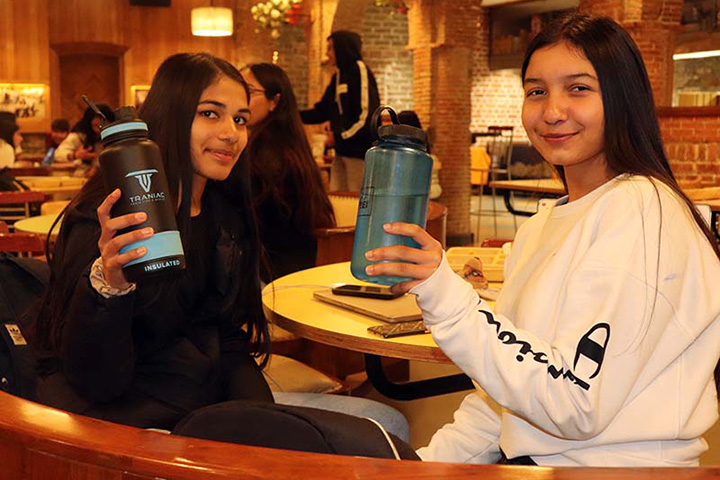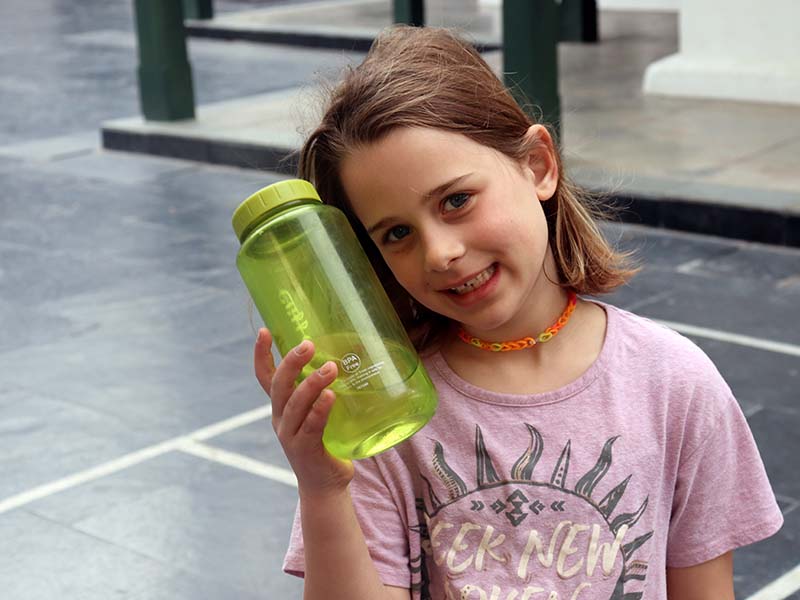
25 Nov Becoming a Reusable Water Bottle Campus
From January, Woodstock is becoming a reusable water bottle campus, where students and staff alike will not be using plastic bottled water at school or in dorms. Principal Dr Craig Cook explains why.
Spinning the bottle
For the industry, It’s the modern-day equivalent of the philosopher’s stone, sought by alchemists to turn base metals into gold. Over forty years or so, bottled water has grown from a niche product into a US$286bn global market. That sort of success in itself isn’t all that extraordinary. The difference here is that the public has been convinced to buy something which, for many, is otherwise essentially free.
What we’ve been sold isn’t the water itself, but an idea of choice, marketed on three selling points: health, lifestyle and convenience. In themselves, these don’t come close to justifying the up-to 2,000% mark-up on bottled water. If this was the only cost, the freedom to buy bottled water would be down to a matter of personal preference. But once you factor in the externalities, the hidden costs of society’s bottled water habit, the true price is proving to be far greater.
"We have been sold a myth – now it’s time to collectively state that we don’t buy it anymore."
After a slow first 100 years, bottled water’s fortunes changed with an ambitious advertising campaign by Perrier in the US in 1977. With the strapline, ‘Earth’s First Soft Drink’, the French brand’s campaign boosted sales from 2.5 million bottles in 1975 to 75 million in 1978, and 300 million a decade later. The rest, including the global fixation on bottled water resulting in around 10% annual growth today, is history.
An air of 1970’s French sophistication isn’t necessarily what you’d associate with a bottle of Bisleri, Kinley or Aquafina, but that marketing drive is arguably the secret of their success today. Perrier sold a lifestyle, a natural, healthy choice which, now ironically, demonstrated your appreciation of nature. I doubt that at the time the advertising executives behind that campaign appreciated the harm to the Earth that ‘soft drink’ would have come to cause a few decades down the line.
Paying an unacceptable price
Bottled water has turned out to have a much higher price than we once imagined. We now globally consume more than one million bottles a minute. Placed end to end, all the bottles consumed annually would reach halfway to the sun. Even if we put aside the environmental impact of the fossil fuels used in its production and transport, many of those bottles which provided a few minutes of convenience will still be here long after we’re gone, expected to take up to a thousand years to degrade. Microplastics are being found be prevalent in previously pristine environments from the Artic to the deepest oceans, and these tiny particles of plastic are entering the food chain from the bottom up, from plankton to insects.
"Given everything we know about the ecological damage caused by single-use plastics, a bottle of water no longer shouts sophistication, but ignorance and apathy to the colossal environmental problems facing us today."
Microplastics are also being found in bottled water, blowing away any arguments that this is somehow a healthy alternative. A study published last year by scientists based at the State University of New York found an average of 325 plastic particles for every litre of water being sold. In one bottle, concentrations were as high as 10,000 plastic pieces per litre. The long-term health ramifications of consuming microparticles are not yet clear, but we owe it to our children to do what we can to alleviate this risk.
Given everything we know about the ecological damage caused by single-use plastics, a bottle of water no longer shouts sophistication, but ignorance and apathy to the colossal environmental problems facing us today.

Becoming a reusable water-bottle campus
That’s why, at Woodstock, we’ve taken the decision to become a reusable water bottle campus from the spring semester, 2020. It’s an initiative that is student-led, with the vast majority signing a petition in support of the move. Victoria and Tala from the Class of 2020 in particular deserve credit for being the driving force behind this initiative. What we are planning is not ground-breaking. We’re not by any means the first institution, or school, to take this step, and it’s a sensible manifestation of our guiding principle of ‘treading lightly on the earth’. In practical terms, what it will mean is that we will stop vendors supplying bottled water to Woodstock, and students and staff alike will not be using plastic bottled water at school or in dorms.
"There may still be a place in this world for bottled water, where clean drinkable water isn’t readily available. But that place is not Woodstock."
Woodstock is just about the last place in the world which should have a bottled water habit. We’re blessed with pure, Himalayan spring water, unlike bottled water companies which inevitably source their water from the plains, many miles from origin. Our water quality is regularly tested, and it goes through a state-of-the-art purification process. There are ample water fountains at school and around dorms, as well as opportunities to acquire reusable bottles. No student will go thirsty for the want of bottled water. Some will have to change their habits and develop new, more sustainable ones, like remembering to carry a reusable water bottle. But building good behaviour is an important element in becoming a responsible global citizen.
There may still be a place in this world for bottled water, where clean drinkable water isn’t readily available. But that place is not Woodstock. We have been sold a myth – now it’s time to collectively state that we don’t buy it anymore. Over the coming weeks, we will share full details of the change, which will take effect after the winter break. In the meantime, we hope that you can support us in this decision, and your children in the transition to a plastic water bottle-free school community.
Dr Craig Cook, Principal






Dr. Ruth Pandey
Posted at 09:39h, 01 DecemberGreat initiative by Woodstock! This is d reason why i always look up to Woodstock and it is very dear to me.
Monal Shah
Posted at 09:51h, 02 DecemberVery true at Woodstock students are lucky to get water from Himalayan source which would be best for their well being.Excellent Initiative.
mik raj
Posted at 11:46h, 09 DecemberHi,
Thanks for sharing information BECOMING A REUSABLE WATER BOTTLE CAMPUS. This information most useful how-to reusable water bottles. I am just referring friends other people.
mikraj
Posted at 17:08h, 09 AprilHi,
Thanks for sharing these articles such as so unique and attractive content.
https://www.tractorjunction.com/tractor-features-and-specifications/421/
Eldrok
Posted at 10:50h, 16 AprilThis article is very informative and useful. Great initiative by Woodstock.
pranavi
Posted at 12:22h, 17 Decemberits very nice blog!
dream care
Posted at 10:43h, 26 DecemberITS VERY NICE BLOG!